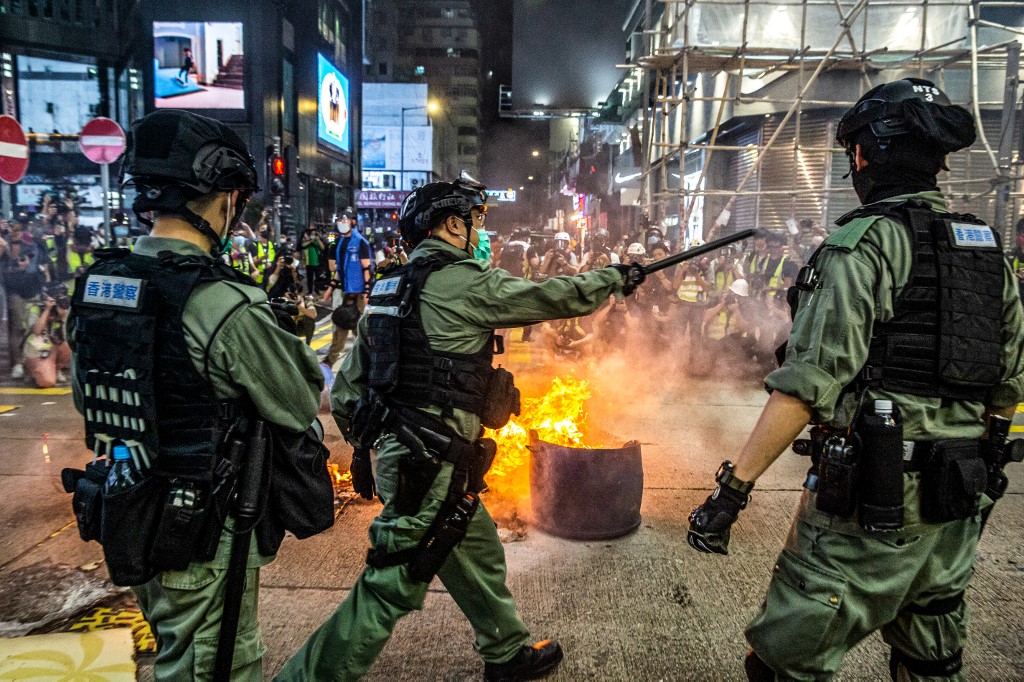Why is Southeast Asia silent on Hong Kong?

Police stand guard on a road to deter pro-democracy protesters from blocking roads in the Mong Kok district of Hong Kong on May 27, 2020, as the city’s legislature debates over a law that bans insulting China’s national anthem. AFP
JAKARTA — Exactly a year ago on June 9, 2019, over a million people in Hong Kong took to the streets and kick-started the anti-extradition bill movement, which morphed into a year-long struggle. Southeast Asia’s silence on this issue reminds us of the lack of democracy in our own region. This article seeks not to comment on the actions by the Chinese or Hong Kong governments; instead, it focuses on the inadequacies within Southeast Asia.
The extradition bill saga dates back to March 2019, and two subsequent marches in June marked its eruption into a large-scale conflict. Even though the Hong Kong Special Administrative Region (SAR) government withdrew the bill, police brutality has been a major issue that continues to be a focus of the movement. An Indonesian journalist, Veby Mega Indah, was blinded by a rubber bullet while reporting the protests. The series of protests cooled down for a brief period due to the pandemic, only to be rekindled as the summer approaches.
Most recently on May 28, China’s National People’s Congress (NPC) approved a proposal to impose a national security law on Hong Kong. Hong Kong’s last British governor Chris Patten claimed that, “The world simply cannot trust this Chinese regime”, calling for the international community to stand up for the city.
This was responded to by Law Kin-wai, director general of the Hong Kong Economic and Trade Office in Jakarta, a unit under the Hong Kong SAR government.
In a letter to the editor of The Jakarta Post, Law defended the rights of the Chinese central authorities to “introduce law at the national level to establish and improve the legal framework and enforcement mechanisms for HKSAR to safeguard national security.”
It is expected that there will be no concrete actions from Asean as a bloc in this regard – Asean neutrality is a defining feature of the regional organization’s foreign policy to begin with. In terms of decision-making, the unanimity rule is central to the Asean Way. Cambodia and Laos have been known for their close ties with and dependence on China. This means that it is unlikely for any declaration unfavorable to China to pass.
However, a major conflict ongoing on Southeast Asia’s doorsteps surely would have prompted a response from some of the Southeast Asian countries, right? After all, then-Malaysian prime minister Mahathir Mohamad lashed out at Myanmar in New York, accusing them of “genocide” and “institutionalized terrorism” against the Rohingya.
Even President Joko “Jokowi” Widodo, normally known for his lack of interest in foreign affairs, suggested South Korean president Moon Jae-in to invite North Korean leader Kim Jong-un to the next commemorative Asean-South Korea summit, reflecting the position of Asean as a platform for wider regional issues.
There are a multitude of answers to the silence of Asean regarding Hong Kong, the most obvious one being Southeast Asia’s dependence on China. China is Asean’s largest trade partner, only behind intra-Asean trade. From Malaysia’s East Coast Rail Link to the Jakarta-Bandung high-speed railway, China has heavily invested in this region under its Belt and Road agenda.
Perhaps even more importantly, the sad truth is that Southeast Asia is not much better, if at all, regarding the degree of democracy in the region. While some Hong Kongers empathized with the protests in Indonesia last year, Southeast Asia’s track record in a democracy is poor and declining. Singapore, for one, has no place to comment on Hong Kong’s protests when young climate activists protesting solo can be arrested for “allegedly taking part in a public assembly without a permit”.
Unsurprisingly, Prime Minister Lee Hsien Loong’s wife Ho Ching has expressed her support of the Hong Kong Police Force through her Facebook page.
This year alone, we have seen the dissolution of the opposition Future Forward Party in Thailand, the collapse of the Pakatan Harapan coalition in Malaysia and alarming threats made by Philippine President Rodrigo Duterte against, for instance, the press and any suspected violators of restrictions during the pandemic.
Democracy is especially vulnerable in times like this, wherein governments justified access to unchecked powers; putting in place regulations that may continue to encroach on citizens’ liberty long after the pandemic passes.
The author, Trustan Yu, is a research assistant at the University of Hong Kong.
Disclaimer: The opinions expressed in this article are those of the author and do not reflect the official stance of The Jakarta Post and INQUIRER.net.




















